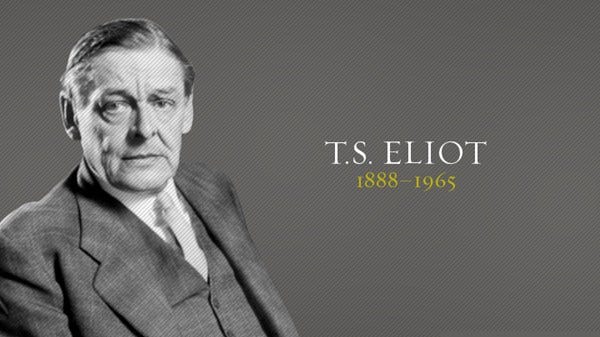Happy TS Eliot Day!
It is day twenty-five of Heritage History month and today we celebrate the reflections of TS Eliot, a cultural critic, poet, and man of letters who spent much of his literary life reflecting on the goodness of culture, in light of its present decline.
Eliot lived a life in search of pathways of Retvrn. Born and raised in St. Louis Missouri to a dedicated Unitarian family, Eliot would eventually betray both his Unitarian and American roots, renounce his US citizenship, and become a British subject and convert to Anglicanism. This to him was core to his overall search for a historically rooted world that repudiated the spirit of change and cultural collapse that was represented by twentieth-century America.
Eliot is known for both his poetry and his essays in social criticism. His most famous poems include “The Waste Land,” “The Hollow Men,” “Ash Wednesday,” and “The Love Song of J Alfred Prufrock.” His best known essays include “Notes Toward the Definition of Culture” and “Christianity and Culture.” Though if you want an introduction to Eliot, I would heartily recommend Russell Kirk’s “Eliot and his Age.”
Much of his poetry acts as a platform for him to reflect on the collapse Western culture in light of the ravages of World War I (Eliot was viscously against the Treaty of Versailles) and the culture dangers of the Industrial Revolution. Eliot had a dark view of man and the present age; though wrapped in promises of Progress, Eliot refused to buy in to what he considered a cheap sort of optimism.
Eliot believed, and expressed through his essays in Criticism, that liberalism could not be sustained. The view that every individual was to set his own path in life, to determine his or destiny, and set his own values, was a path to cultural collapse. He recognized the possibility that such a social impulse could temporarily produce material abundance, but that it would concomitantly sever society from Culture. And in separating society from culture, both society and culture would disappear. Western man would forget the religious impulse that once ground him, that chastened him, and he would convince himself that man could actually be irreligious. But all this was a lie, in the eyes of Eliot.
He once noted:
“The tendency of unlimited industrialism is to create bodies of men and women – of all classes – detached from tradition, alienated from religion, and susceptible to mass suggestion: in other words, a mob. And a mob will be no less a mob if it is well fed, well clothed, well housed, and well disciplined.”
The problem, however, that made our epoch especially difficult, was that it had wrapped its new social impulses in the language and dress of Christianity; such Christianity was mobilized on behalf of a sociological impulse that was undermining Christian tradition. A Christianity without tradition, for Eliot, was actually just Jacobinism. In order for Modern Man to deal seriously with his predicament, he needed the very thing he hated the most: a rejection of his own hubris, drunken optimism, and a sense of piety about the world and man’s own limits therein.
My favorite set of lines from Eliot is a reflection on modern man’s collapse, wrapped as it is the the language of progress. It comes from “The Rock.”
“O perpetual recurrence of determined seasons,
O world of spring and autumn, birth and dying
The endless cycle of idea and action,
Endless invention, endless experiment,
Brings knowledge of motion, but not of stillness;
Knowledge of speech, but not of silence;
Knowledge of words, and ignorance of the Word.
All our knowledge brings us nearer to our ignorance,
All our ignorance brings us nearer to death,
But nearness to death no nearer to GOD.Where is the Life we have lost in living?
Where is the wisdom we have lost in knowledge?
Where is the knowledge we have lost in information?
The cycles of Heaven in twenty centuries
Bring us farther from GOD and nearer to the Dust.”





Where does that Eliot quote about industrialism come from?